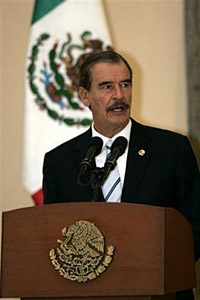 |
 |
 |
 News Around the Republic of Mexico | November 2005 News Around the Republic of Mexico | November 2005  
Fox Obtains Little from Bush
 Alistair Bell - Reuters Alistair Bell - Reuters


| Mexico's President Vicente Fox speaks during the National Sports Award ceremony on Sunday Nov. 20, 2005, in Mexico City.
(AP/Jose Luis Magana) |
Branded a "lap dog" of imperialism, Mexican President Vicente Fox has earned contempt from leftist Latin American leaders for his close ties to the United States, and little in return from Washington.

A plan to let more immigrants work legally in the United States - Mexico's headline foreign policy goal - has become bogged down in Congress after five years of lobbying from Fox.

That is despite Fox taking flak from critics of the United States in the region for defending U.S. proposals for regional free trade. Mexico also feels let down by U.S. criticism of its fight against drug gangs on the border.

President Hugo Chavez of Venezuela and Nestor Kirchner of Argentina this month harangued Fox for promoting a planned Americas-wide trade pact known as the FTAA which left-wing leaders complain will be slanted to benefit the United States.

Mexico and Venezuela withdrew ambassadors last week as Chavez refused to apologize for calling Fox a U.S. lap dog and warned, "Don't mess with me, mister, or you'll get stung."

The dispute was similar to a fight Fox had with Cuba last year about human rights and Mexico's good relations with its northern neighbor.

Although Fox has defied Washington over the war in Iraq, the former Coca-Cola executive is still seen as one of George W. Bush's main allies in Latin America, where public sentiment is wary of the U.S. president.

In spite of his pro-U.S. credentials, Fox has failed to persuade the United States to overhaul immigration legislation to allow millions more Mexicans to work there legally.

"That didn't work very well for the administration of Fox. There is no question that Mexico was hoping for a lot more. It did not come away a winner from the United States over the past years," said Peter Hakim, head of the Inter-American dialogue think tank in Washington.

Senior Mexican government officials acknowledge privately they doubt that U.S. lawmakers will pass a planned guest worker program, a watered-down version of immigration reform sought by Mexico, in the year Fox has left in office.

AMIGOS, KIND OF

Bush got on famously with fellow conservative and rancher Fox at the start of his first term, but the friendship cooled when Washington's focus switched to the Middle East and security after September 11, 2001.

The pair met briefly on Friday at an Asian-Pacific summit in South Korea and discussed trade.

The Bush administration's main concern in dealing with Mexico is a border free from terrorists and drug smugglers, said Carlos Jimenez, a senior opposition member of the Mexican lower house's foreign relations committee.

"At the end of the day, what the United States is interested in is security. The issue of its own security, a safe border," he said.

Mexico bristled early this year at criticism from the State Department that it is failing to contain a drug feud that has killed 1,000 people in northern and western Mexico this year.

While Fox has not won any new U.S. immigration legislation, U.S. analysts point out that in practice authorities often turn a blind eye to illegal Mexican workers.

Some states even recognize documents known as "matriculas consulares" which allow undocumented Mexicans to obtain driving licenses and open bank accounts.

"There's no major effort to deport Mexicans. If they run foul of the law they might get deported but there's no workplace enforcement in the U.S. that amounts to anything, plus the Bush administration has turned a blind eye to the matriculas consulares," said George W. Grayson of the College of William and Mary in Virginia.

Money sent home from Mexican workers abroad is set to reach a record $20 billion this year, making it Mexico's second-largest source of foreign revenue after oil exports.

Wall Street fears that leftist Andres Manuel Lopez Obrador may win Mexico's presidential elections in July and become the latest anti-U.S. leader in Latin America.

But Lopez Obrador appears unsure about foreign policy and has avoided targeting the United States in otherwise fiery campaign speeches.

"If I reach the presidency I am going to respect Chavez, Bush and everyone," he said last week. | 
 | |
 |



